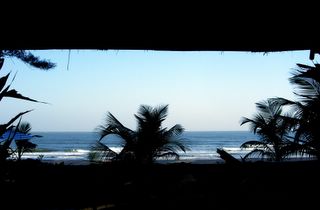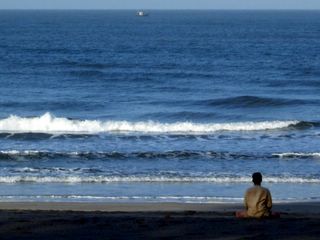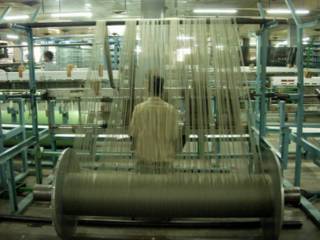Thursday, May 12, 2005
Shack with a view!

An early morning shot, this beach is fertile ground for exploring angles and subjects. So much so that even while I was having my breakfast under this shack, my eyes were roving with curiosity when I stumbled upon this view from where I was sitting. Smack in my face! And I was looking around for subjects! Ganapatipule makes you spiritual!
"That's me in the corner"

Having spent 5 days in the party town of Goa, it was a refreshing break to wake up to the crashing waves of the Arabian Sea at 7 in the morning at Ganapatipule (a small town between Bombay and Goa). Driving back from Goa to Bombay, we had to pitch our tents at sunset (and quite literally so) at Ganapatipule. A desolate beach by any urban standards, it does tempt you to meditate, but then the view is too good to close your eyes and be selfish enough to think about your thoughts!
Sunday, May 08, 2005
Now Let There Be Light
Last week I was explaining the mechanics of a camera to my young nephew. Like any other 9-year old, he asks too many questions. “Why do we need films for taking pictures?” “What is the film made of?” “Where is the picture stored?” “What is an aperture?” “Why do we need an aperture?” “Where is the processing of the film done?”
I was wading myself quite successfully through his intricate web of questions until this googly flummoxed me completely: “What is light?” Thinking that I am a photographer and this should be easy to explain, I started by re-visiting my high school concepts, but failed miserably in explaining the chief characteristics of light. I was aware of the endless debate in the scientific community of light being a particle and a wave depending on the experiment “you” are performing.
“Beats me!” said the young chap.
“Of course” I said.
Therefore, I hit the seminal book on Physics called “The Dancing Wu Li Masters” by Gary Zukav. This book is meant for a bloke like me who does not know his elbow from his ass when it comes to physics (and most other things!). This book took me through an interesting array of experiments conducted by scientists in the early parts of the 20th century to determine the chief characteristics of light. The 1923 experiment conducted by Arthur Compton that caused light to manifest both wave-like properties and particle-like properties revealed this conceptual paradox. In his experiment, Compton fired x-rays (which everybody knows are waves) at electrons. The consequence of this firing was the deflection of the x-ray from the moment it hit the electron, signifying that the x-ray was behaving like particle! Compton measured the loss in energy of the x-ray by calculating the frequency of the x-ray before and after hitting the electron. But hold it right there! I thought only waves have frequencies and not particles! If that be not true, then you and I too have a frequency! In the all-too-familiar double-slit experiment, where light has been touted to behave like wave, I was concerned by now as to how to explain all this to a 9-year old!
To compound the situation, the author went on to delve into the realms of philosophy. To quote him,
“Wave-like behavior and particle-like behavior are properties of interactions”
My eyes went wide open when the implication of this statement hit me! Without our interaction, light does not exist! Conversely, without light, or, by implication, anything else to interact with, we do not exist!
These experiments and the observations of the scientists conducting the experiments seem more like sounds bytes of a mystic rather than that of a scientist’s doctoral thesis. Following is an extract from the book to give you a flavor of what I was dealing with:
“‘We are not sure,’ they tell us, ‘but we have accumulated evidence which indicates that the key to understanding the universe is you’”
The moot point here is that the common denominator in all this debate is “I” that goes through all the experiences. So does that mean that what we experience is not external reality, but our interaction with it?
I am sure when He created Man, He didn’t say “Let there be light”. He must’ve heaved a sigh of relief and said “Now let there be light”
I decided to wait for my nephew to grow old to understand all this. In the meantime, I bought him a generous pack of chocolates.
I was wading myself quite successfully through his intricate web of questions until this googly flummoxed me completely: “What is light?” Thinking that I am a photographer and this should be easy to explain, I started by re-visiting my high school concepts, but failed miserably in explaining the chief characteristics of light. I was aware of the endless debate in the scientific community of light being a particle and a wave depending on the experiment “you” are performing.
“Beats me!” said the young chap.
“Of course” I said.
Therefore, I hit the seminal book on Physics called “The Dancing Wu Li Masters” by Gary Zukav. This book is meant for a bloke like me who does not know his elbow from his ass when it comes to physics (and most other things!). This book took me through an interesting array of experiments conducted by scientists in the early parts of the 20th century to determine the chief characteristics of light. The 1923 experiment conducted by Arthur Compton that caused light to manifest both wave-like properties and particle-like properties revealed this conceptual paradox. In his experiment, Compton fired x-rays (which everybody knows are waves) at electrons. The consequence of this firing was the deflection of the x-ray from the moment it hit the electron, signifying that the x-ray was behaving like particle! Compton measured the loss in energy of the x-ray by calculating the frequency of the x-ray before and after hitting the electron. But hold it right there! I thought only waves have frequencies and not particles! If that be not true, then you and I too have a frequency! In the all-too-familiar double-slit experiment, where light has been touted to behave like wave, I was concerned by now as to how to explain all this to a 9-year old!
To compound the situation, the author went on to delve into the realms of philosophy. To quote him,
“Wave-like behavior and particle-like behavior are properties of interactions”
My eyes went wide open when the implication of this statement hit me! Without our interaction, light does not exist! Conversely, without light, or, by implication, anything else to interact with, we do not exist!
These experiments and the observations of the scientists conducting the experiments seem more like sounds bytes of a mystic rather than that of a scientist’s doctoral thesis. Following is an extract from the book to give you a flavor of what I was dealing with:
“‘We are not sure,’ they tell us, ‘but we have accumulated evidence which indicates that the key to understanding the universe is you’”
The moot point here is that the common denominator in all this debate is “I” that goes through all the experiences. So does that mean that what we experience is not external reality, but our interaction with it?
I am sure when He created Man, He didn’t say “Let there be light”. He must’ve heaved a sigh of relief and said “Now let there be light”
I decided to wait for my nephew to grow old to understand all this. In the meantime, I bought him a generous pack of chocolates.
Saturday, May 07, 2005
Friday, May 06, 2005
Wednesday, May 04, 2005
Musings of a Meandering Mind
A common perception about industrial photography is that it tends to get boring. I do not “beg” to differ because I just differ. Agreed that it is devoid of the glamour associated with the other forms of photography viz. fashion, nature, food, babies, sports, etc. What attracts me to this genre of photography are the journeys to remote locations where the factory/unit is located, highway drives, stopovers at inns and dhabas, new, but downright deglamourised faces, machines and workers. Sitting in my study, poring over the images and editing them with my favorite software program, presents a contradictory picture. It’s the anti-thesis of life surrounding a factory in a village only reachable after two train switches, one bumpy bus ride and one rickety rickshaw ride. Experiencing the extremes of the comfort spectrum is what keeps me grounded.
On the ‘Travel & Living’ channel: ‘the world is like a book and those who do not travel read just one page!’ On my recent assignment, I traveled by road to the north of Bombay. And I was astounded by the beauty of the landscape just 20 kilometers from where I live. Undulating hill ranges, wide creeks with glistening ripples of sea-water, thick foliage of mangroves, jet black tarmac roads with white strips in the middle, the strong smell of salt-water and soft lilting music from the car stereo. So I sit back and let the air rush in through the open window.
More often than not, a guide is assigned by the client who opens doors to areas where cameras are generally not allowed! As usual, the guide turns out to be one of those chirpy type who regales you with the stories and anecdotes related to the surroundings. So this time, I had my fair share of stories of floods caused by monsoons, death of a truck cleaner caused by another truck backing into him, train derailments and injuries of passengers hanging out of over-loaded trains.
I feel blessed when such people, places and experiences touch my life. That’s when I look forward to my next assignment. That’s when I am reminded of the Travel & Living one-liner that tells me that I am reading a book called “The World”.
On the ‘Travel & Living’ channel: ‘the world is like a book and those who do not travel read just one page!’ On my recent assignment, I traveled by road to the north of Bombay. And I was astounded by the beauty of the landscape just 20 kilometers from where I live. Undulating hill ranges, wide creeks with glistening ripples of sea-water, thick foliage of mangroves, jet black tarmac roads with white strips in the middle, the strong smell of salt-water and soft lilting music from the car stereo. So I sit back and let the air rush in through the open window.
More often than not, a guide is assigned by the client who opens doors to areas where cameras are generally not allowed! As usual, the guide turns out to be one of those chirpy type who regales you with the stories and anecdotes related to the surroundings. So this time, I had my fair share of stories of floods caused by monsoons, death of a truck cleaner caused by another truck backing into him, train derailments and injuries of passengers hanging out of over-loaded trains.
I feel blessed when such people, places and experiences touch my life. That’s when I look forward to my next assignment. That’s when I am reminded of the Travel & Living one-liner that tells me that I am reading a book called “The World”.
Mundra
A huge project spanning an entire exports conglomerate ranging from an International Container Terminal and a sea-port on one hand and hyper markets and HR conferences on the other. Interspersed were the in-house 37 miles of railway network, neighboring undeveloped land that will one day house a state-of-the-art exports hub, a lagoon and lots of friendly workers and employees. The whole place is like a self-contained private city.
Situated at a strategic location in the Gulf of Kutchch, Mundra is home to India’s largest private sector sea-port.
On the mandate for the visit were the sea-port, oil refinery, rail network, international container terminal and the social infrastructure. With a hard earned permission to shoot the international container terminal that caters to the “Big Daddies” of shipping, one full evening was dedicated to the recce of the terminal’s grounds. The main subject of our interest was a ship that was being loaded by cranes worth “a few million dollars”. But nothing beats the impromptu angles generated from the comfort of a tug boat at sea. From the tug-boat, we could view the entire length of the ship with the mammoth cranes in the background.
The routine killed you… but the results made you feel alive!
Situated at a strategic location in the Gulf of Kutchch, Mundra is home to India’s largest private sector sea-port.
On the mandate for the visit were the sea-port, oil refinery, rail network, international container terminal and the social infrastructure. With a hard earned permission to shoot the international container terminal that caters to the “Big Daddies” of shipping, one full evening was dedicated to the recce of the terminal’s grounds. The main subject of our interest was a ship that was being loaded by cranes worth “a few million dollars”. But nothing beats the impromptu angles generated from the comfort of a tug boat at sea. From the tug-boat, we could view the entire length of the ship with the mammoth cranes in the background.
The routine killed you… but the results made you feel alive!


















